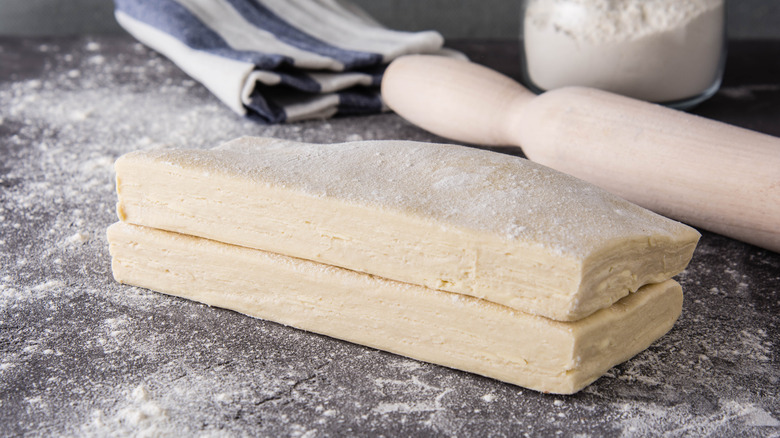How Room Temperature Can Ruin Your Puff Pastry
For many recipes, like cakes and brownies, you typically need to let your ingredients reach room temperature before you start baking. You should allow things like eggs, milk, and butter to warm up because it helps them cream together smoothly and creates a more consistent bake. However, there are a few exceptions to this rule. Pastries like pie crust, southern biscuits, or puff pastry all need to be kept cool — as close to freezing as they possibly can be.
Sometimes, you don't want to fully incorporate your ingredients together. Puff pastry (Pâte Feuilletée) is a pastry built of thin layers of dough and butter — these layers mean that the dough has been laminated and will become flaky and light upon baking (via Bakerpedia). Puff pastry can be used for both savory and sweet dishes, like tarts, wellingtons, and allumettes, because of its delicate and crispy nature. The only way for puff pastry to maintain its lamination, though, is if it remains chilled. Leaving your dough at room temperature could ruin it completely.
Chill out your puff pastry
Room temperature can easily ruin the quality of your puff pastry. As we've previously shared, puff pastry relies on lamination — alternating layers of dough and butter so that they're stacked on top of each other but do not incorporate. These layers are extremely thin, and the only way to keep the butter from melting and bleeding into the pastry is by keeping it as cold as possible. If the butter begins to melt into the dough, it will lose its shape and become difficult to work with. Plus, the pockets of butter will not force the pastry to puff when it's baking (via Culinary Choice).
Remember to keep an eye on the time when working with puff pastry to ensure you don't leave the dough out long enough to reach room temperature (via The Kitchn). To prevent this issue, store your puff pastry in the freezer or refrigerator as long as you can. If you aren't working with the dough, always return it to the refrigerator before starting your next task.

